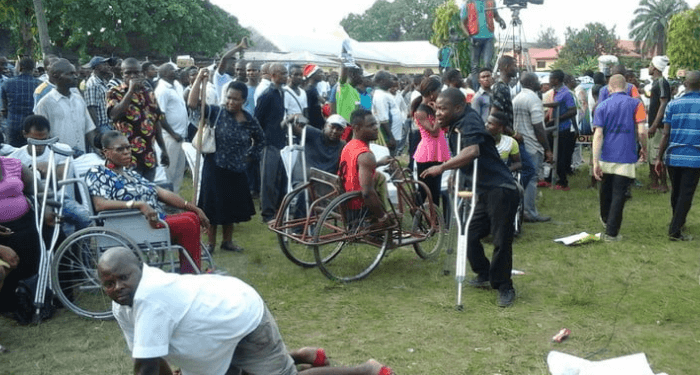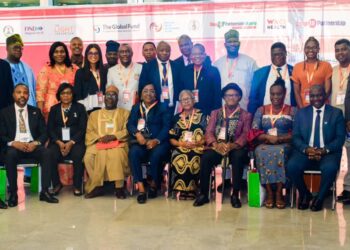Nigeria’s banking system must embrace disability inclusion, empowering millions and boosting the economy while ensuring access for all customers
Ada sat outside a bank in Anambra, clutching her Automated Teller Machine (ATM) card with a sense of determination.
The air conditioning hummed softly from inside, and the rhythmic beeps of transactions being processed filled the silence, but for Ada, the steps and the heavy doors of the bank symbolised an unbreakable barrier.

As a wheelchair user, the lack of accessibility at the bank was more than just an inconvenience—it was a reminder that the financial sector in Nigeria remains largely inaccessible to millions of disabled individuals.
She waved at the security guard, who hesitated and called a banker to speak with her. “Madam, you should come with someone next time,” the bank official muttered.
Ada swallowed her frustration—yet again, she was left feeling as though she didn’t belong. This was not just an isolated incident for Ada; it was the reality for many people with disabilities across the country.
According to the National Bureau of Statistics (NBS), approximately 8 percent of Nigeria’s adult population, or 5.1 million people, live with disabilities.
Despite this, the financial industry continues to treat them as an afterthought, with banking halls that are inaccessible, ATMs that are blind to the needs of the visually impaired, and processes that often serve only to humiliate rather than empower.
**The Burden of Assumptions**
Many financial institutions still perceive people with disabilities as charity cases. This assumption leads to them being excluded from basic financial services.
For example, Chuka, a visually impaired entrepreneur in Lagos, faced rejection when he applied for an ATM card.
The bank manager’s refusal, citing “security concerns,” was followed by an embarrassing request for Chuka to sign an affidavit, absolving the bank of liability should he “misuse” his card.
Meanwhile, his sighted peers walked out with their ATM cards with no questions asked.
This mindset—the belief that individuals with disabilities cannot manage their own finances—is a barrier that locks millions out of the financial system, reinforcing a cycle of exclusion and dependence.
**An Economic and Ethical Imperative**
Banks in Nigeria, like those worldwide, measure success through economic performance and ethical reputation.
However, both of these are at risk when a significant portion of potential customers is excluded from participating in the financial system.
Consider the numbers: if just half of Nigeria’s 5.1 million adult persons with disabilities were actively banking and saving as little as ₦20,000 monthly, the total annual savings would amount to
₦1.2 trillion—more than the combined budgets of Ekiti and Osun states for 2024. This excludes the financial activities of family members and carers who might choose to engage with businesses that prioritise accessibility.
Beyond the financial benefits, there is also an ethical imperative. Nigeria’s financial institutions have signed the National Sustainable Banking Principles, which include social and governance considerations.
Yet, these principles fail to adequately address disability-specific interventions. True inclusion cannot be reduced to CSR reports but must be embedded in the daily operations of banks.
**A Glimpse of Progress**
Not all banks are blind to the issue of disability inclusion. Some, like Access Bank, Standard Chartered, and Sterling Bank, have initiated disability-inclusive banking programs, such as employing persons with disabilities and offering products tailored to their needs.
While these steps are commendable, they are still exceptions rather than the rule. What is needed is a systemic shift towards full inclusion in the financial sector.
**Learning from Global Best Practices**
Nigeria does not need to start from scratch when it comes to inclusive banking. Countries like Kenya, South Africa, and the United Kingdom have successfully implemented financial ecosystems that serve persons with disabilities.
Here are key steps Nigeria must take:
1. **Regulatory Action:** The Central Bank of Nigeria (CBN) must update its National Financial Inclusion Strategy to explicitly include policies that cater to persons with disabilities.
This would involve enforcing accessibility standards in bank branches, requiring disability sensitivity training for bank staff, and ensuring that digital banking platforms meet Web Content Accessibility Guidelines (WCAG).
2. **Human-Centered Design:** Financial products should be designed with input from people with disabilities. For instance, while UBA’s introduction of Braille account opening forms was well-intentioned, it is impractical as blind users cannot submit forms written in Braille.
Instead, banks should focus on accessible digital onboarding processes.
3. **Inclusive Financial Programmes:** Financial literacy programs and government initiatives should include persons with disabilities explicitly.
Start-up funding programs should require that entrepreneurs with disabilities have access to bank accounts, helping them integrate into the formal economy.
4. **Accessible Currency:** The CBN, in partnership with the Nigeria Minting and Printing Company, should ensure that currency is accessible for visually impaired individuals.
Similar to the UK, where banknotes feature tactile markings for the blind, Nigerian currency should be redesigned to aid independence for those with visual impairments.
**Beyond Inclusion—A Future of Economic Empowerment**
The financial sector in Nigeria stands at a crucial juncture. Excluding people with disabilities from the banking system is not just an issue of fairness—it’s an economic miscalculation.
An inclusive financial system would not only serve persons with disabilities but also strengthen the economy, foster innovation, and expand the customer base.
It is time for Nigerian financial institutions to stop viewing persons with disabilities as burdens and begin recognising them as active economic participants.
Instead of treating them as recipients of charity, banks should see them as customers to serve, with the potential to contribute meaningfully to a thriving economy.
For Ada, for Chuka, and for the millions of others like them, the doors to financial independence must open—not in theory, but in practice.









